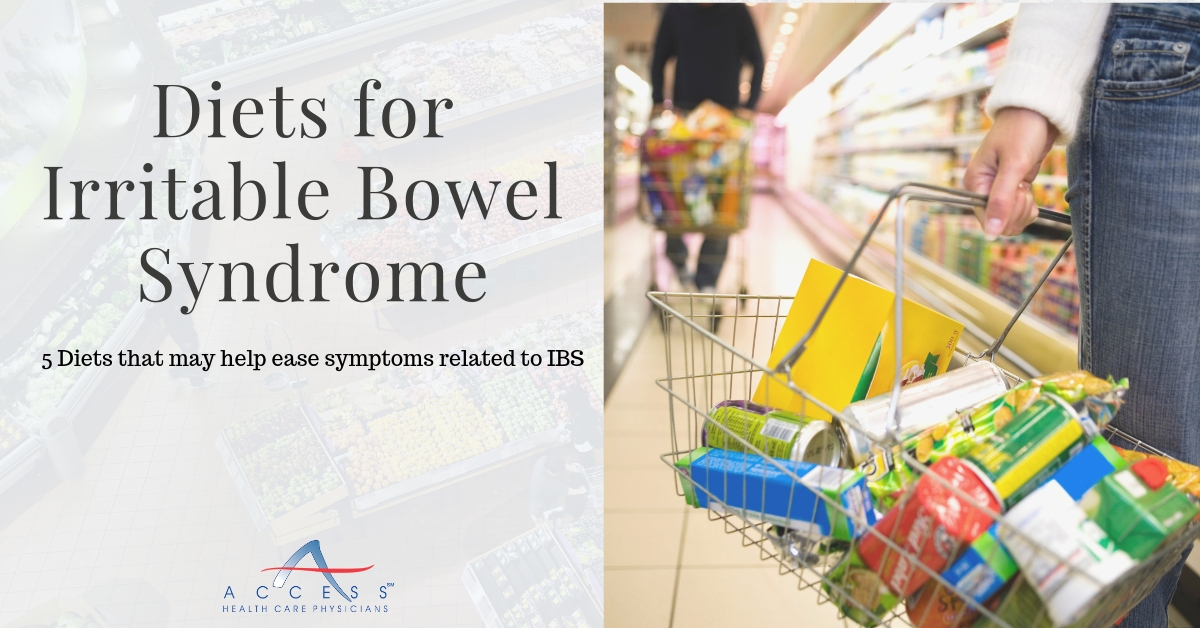Irritable bowel syndrome (IBS) is an intestinal disorder typically characterized by dramatic changes in bowel movements. The symptoms of IBS vary greatly patient to patient but may include any, or any combination, of the following:
- Diarrhea
- Constipation
- Cramping
- Bloating
- Gas
- Abdominal pain
The National Institute of Diabetes and Digestive and Kidney Diseases reports that about 10-15% of US adults are affected by IBS. The number tends to be higher in women than in men. The exact cause of IBS in unknown, and medical intervention may be necessary for the treatment of IBS, but most doctors may also recommend a change in lifestyle and diet. There are many diets that may help reduce the symptoms of IBS and it may be necessary to try several before finding what works for you. Always speak with your doctor before making lifestyle or diet changes so they can help monitor your symptoms and overall health.
- FODMAP Diet - FODMAPs stands for “fermentable oligosaccharides, disaccharides, monosaccharides, and polyols.” That’s a mouthful! In more simple terms, FODMAPs are carbohydrates that your body has difficult digesting. These carbs tend to pull fluids as the body processes them, which may cause bloating, gas or diarrhea in those with IBS. By reducing high FODMAP foods, a patient with IBS may experience reduced discomfort. The FODMAP diet was developed by a team of researchers in Australia.
It is important to note that not all carbohydrates are high FODMAPs. Here are a few to avoid:- Dairy (with lactose) including milk, ice cream, cheese and yogurt.
- Beans/Legumes
- Cashews and pistachios
- High-fructose corn syrup
- Some fruits (these include apples, pears, peaches, watermelon and more)
- Some vegetables (onions, broccoli, artichoke, Brussels sprouts, and more)
- Wheat-based products including bread, pasta and cereal
- Sweeteners
Foods low on the FODMAP scale may be enjoyed freely – those include:
- Vegetables including: lettuce, cucumber, eggplant and baby spinach
- Fruits including: Berries (strawberries, blueberries & raspberries,) grapes & kiwi
- Fish: salmon, lobster, shrimp & crab
- Starches, cereals & grains: quinoa, brown rice
- Meats: lean cuts of chicken, turkey, beef and lamb
- Fats: “Good fats” such as seeds, butter, nuts and olive oil
- Elimination Diet - As the name implies, this diet includes removing one food or type of food from your diet for an extended period of time to see if IBS symptoms are reduced. The International Foundation for Functional Gastrointestinal Disorders (IFFGD) gives a few examples of the most common foods to try to eliminate for the reduction of IBS symptoms:
Your doctor may also give other recommendations on foods you could try to avoid. The gluten-free diet may also fall under this category and would include eliminating any foods containing gluten.
- Nuts
- Insoluble fiber
- Coffee
- Chocolate
- High-fiber Diet - The average adult should eat 20-35 grams of fiber each day. Fiber works to add bulk to your stools, which helps everything move along properly. Fiber-rich foods may help prevent constipation. These high-fiber foods may include fruits, vegetables and whole grains. If you experience gas or bloating after upping your fiber intake, try focusing on soluble fiber, found in fruits and vegetables while limiting your grains.
- Low-fiber Diet - If your IBS symptoms tend to include gas and diarrhea, increasing your fiber intake may worsen your symptoms. Instead of limiting, or eliminating, fiber from your diet try to focus on including soluble fiber. This type of fiber dissolves in water instead of adding bulk. Some examples of soluble fiber include: apples, berries and oatmeal. (Insoluble fiber is found in items such as wholegrains, nuts, broccoli and raisins.)
- Low-fat Diet - High-fat foods are usually low in fiber, which can worsen some IBS symptoms. The Cleveland Clinic reports that high-fat diets are especially problematic for people who experience mixed IBS symptoms, which is characterized by experiencing a combination of both diarrhea and constipation. In addition to worsening some IBS-related symptoms, a high-fat diet has been linked to many other health issues.
Some of these diets may help to reduce IBS related symptoms, but every person is different. Try keeping an IBS journal to record changes in your IBS symptoms and what you may have eaten that could be linked to the symptoms. Remember to speak with your doctor before making major lifestyle or diet changes to avoid an overly-restrictive diet.
For more informative articles like this, be sure to like and follow us on Facebook, Instagram and our blog page for more information about IBS-friendly diets, articles on digestive health and more.
Written By: S. Campbell for Access Health Care Physicians, LLC.


